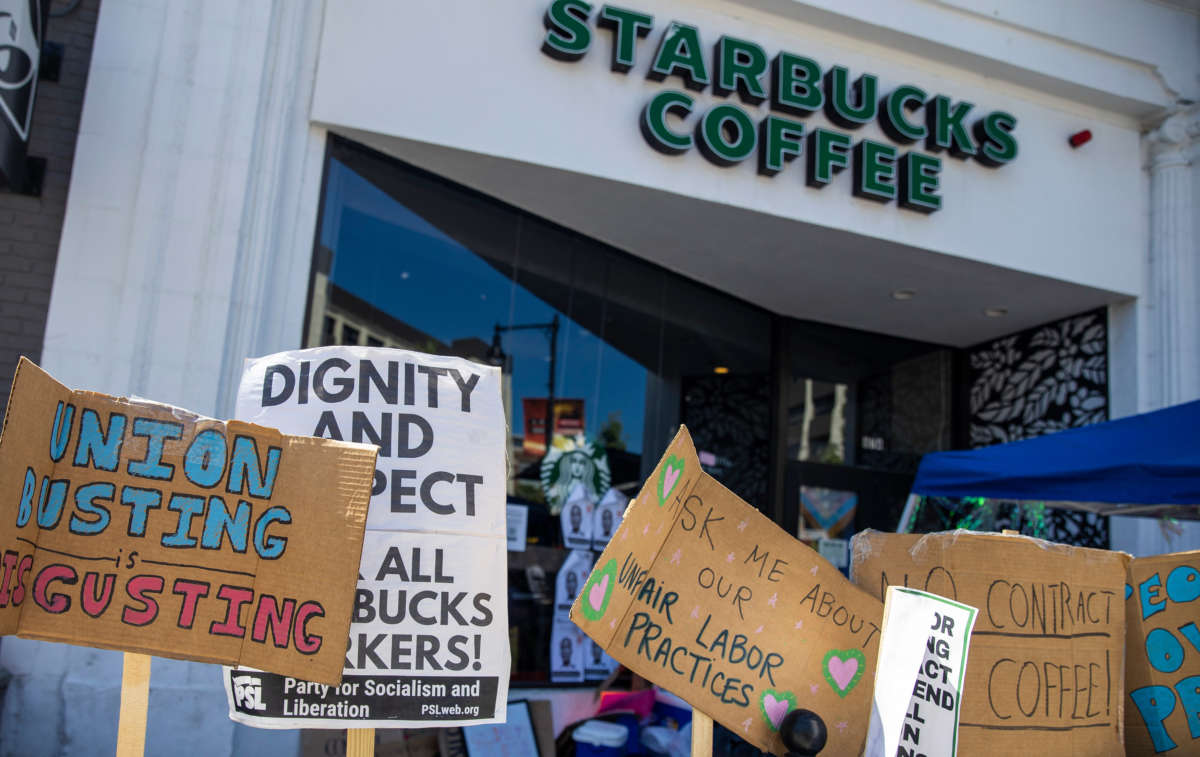Honest, paywall-free news is rare. Please support our boldly independent journalism with a donation of any size.
A U.S. district judge ruled on Thursday that Starbucks must reinstate seven union organizers that the company fired in Memphis, Tennessee, in February after the judge found “reasonable cause” in allegations from the National Labor Relations Board (NLRB) that the company had engaged in unlawful union busting.
District Judge Sheryl H. Lipman ruled that Starbucks had fired the workers for pro-union activities that are protected by federal labor law and that it otherwise took actions to interfere with the union campaign at the store. Lipman gave the company five days to reinstate the workers, though the company is planning to appeal the ruling.
Along with the reinstatement, Lipman ordered the company to expunge disciplinary action taken against one of the fired employees and post copies of the court order at the Memphis store for employees to see.
The ruling is a major win for Starbucks Workers United, which had rallied behind the “Memphis Seven” after their firing, calling it the company’s “most blatant act of union busting yet.” An injunction is one of the strictest forms of relief that the NLRB can seek against a union-busting company.
“I’m so happy with this outcome,” Florentino Escobar, one of the fired workers, told The Washington Post. “This is one more step to make Starbucks a better place.”
When the workers were fired in February, the company cited a number of store policies that the workers had supposedly broken. The terminations generated outrage among the union and pro-union workers, who said that in most cases, the company cited policies that didn’t exist or that were never previously enforced.
The company had claimed that, in firing the workers that made up nearly the entire organizing committee at the store, it was only enforcing its employee policies, an argument in which the judge did not find merit. The company also argued in a court filing that the injunction wasn’t needed because the terminations “emboldened union organizing activities in Memphis and throughout the nation.”
In a statement released after the ruling came down, the company said that it “strongly disagree[s]” with the decision.
NLRB General Counsel Jennifer Abruzzo hailed the ruling, calling it a “a crucial step in ensuring that these workers, and all Starbucks workers, can freely exercise their right to join together to improve their working conditions and form a union.”
“Starbucks, and other employers, should take note that the NLRB will continue to vigorously protect workers’ right to organize without interference from their employer,” she went on.
Since firing the Memphis workers, Starbucks has fired roughly 70 more employees in its fierce anti-union campaign. Workers have waged strikes against the company’s efforts to fire pro-union workers, close unionized stores, and interfere with elections, but the company’s union-busting efforts show no sign of stopping.
Earlier this week, Starbucks sent a letter to the NLRB asking it to temporarily suspend all union elections within the company. Labor experts say that the move is an attempt to delay union elections to give the company more time to convince workers to vote against unionizing and potentially throw the legitimacy of the NLRB itself into question.
The NLRB is currently prosecuting Starbucks over the board’s findings that the company had broken the law over 200 times in its effort to halt the union effort in Buffalo, where the union movement began.
A terrifying moment. We appeal for your support.
In the last weeks, we have witnessed an authoritarian assault on communities in Minnesota and across the nation.
The need for truthful, grassroots reporting is urgent at this cataclysmic historical moment. Yet, Trump-aligned billionaires and other allies have taken over many legacy media outlets — the culmination of a decades-long campaign to place control of the narrative into the hands of the political right.
We refuse to let Trump’s blatant propaganda machine go unchecked. Untethered to corporate ownership or advertisers, Truthout remains fearless in our reporting and our determination to use journalism as a tool for justice.
But we need your help just to fund our basic expenses. Over 80 percent of Truthout’s funding comes from small individual donations from our community of readers, and over a third of our total budget is supported by recurring monthly donors.
Truthout has launched a fundraiser to add 500 new monthly donors in the next 10 days. Whether you can make a small monthly donation or a larger one-time gift, Truthout only works with your support.
